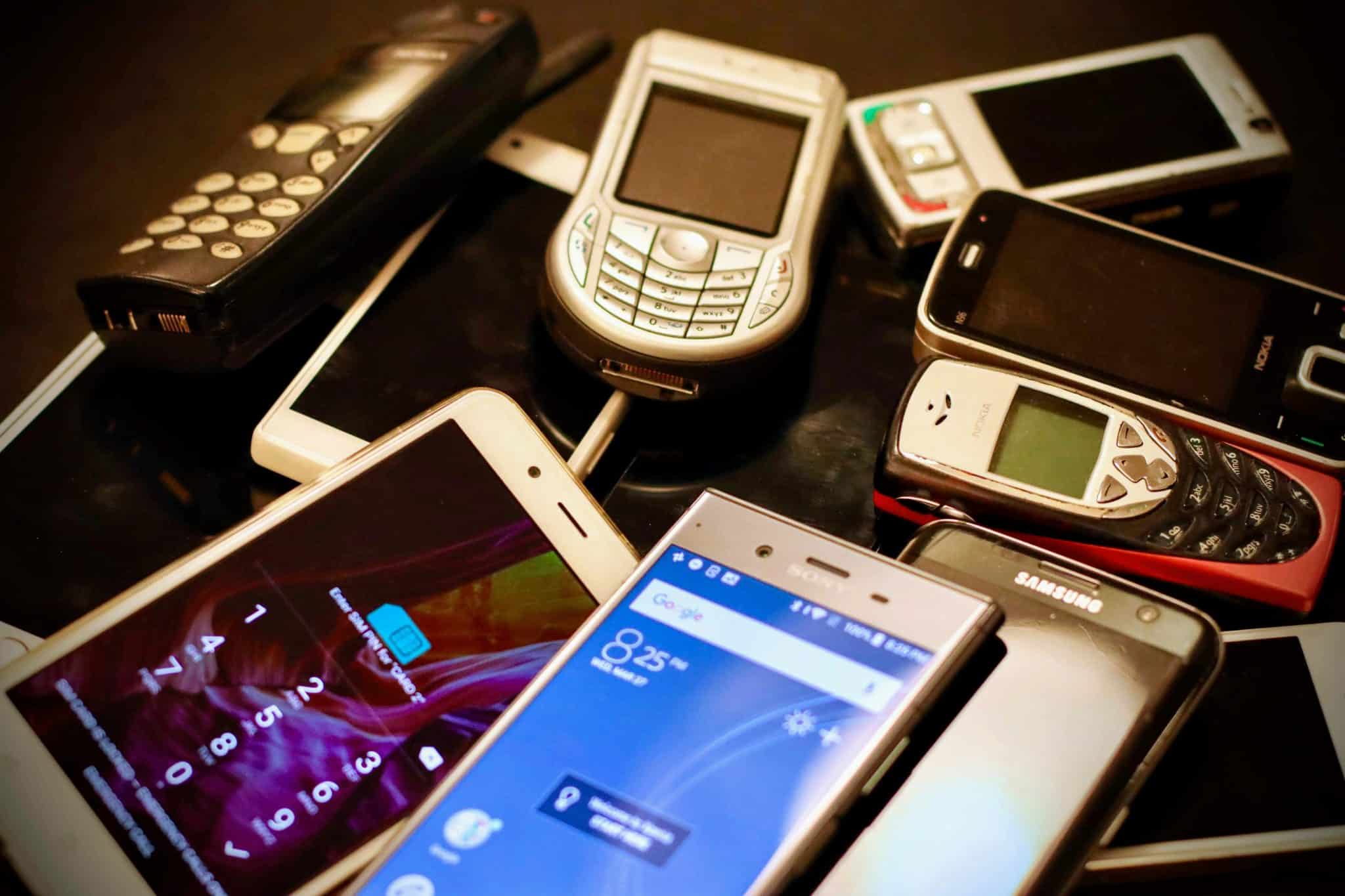What Is the Right Amount of Time to Spend on Your Phone?
[Update February 23, 2024]
How much time did you spend on your phone yesterday?
Most of us don’t have a clue. While we text, browse social media and interact with addicting mobile apps, minutes slip away. Smartphone use has become so prevalent that we hardly even notice it anymore.
It’s hard to believe that only 11 years have passed since the first iPhone release. Now, with people spending an estimated five hours a day on their mobile devices, smartphones have become a crucial part of our daily routines. An estimated 2.3 billion users are touching their phones thousands of times a day. The pace is only accelerating.

Some medical professionals and parents have voiced concerns about excessive smartphone use for children and teens. Their worries include:
- Altered brain chemistry (contributing to symptoms like depression and anxiety)
- Decreased quality of real-life relationships
- Hunched shoulders, “text neck”, and other posture issues
- Insomnia
- Self-esteem issues
- Vision problems
You’ve probably heard of some of these symptoms already. But while the health community has scrambled to raise awareness and establish guidelines for children and teens, adults have been left out of the conversation. We’ve been left to our own devices (no pun intended!) to figure out how much time to spend on our phones each day.
Intentionality: A Key Ingredient for Healthy Smartphone Use
One of the biggest challenges about regulating your smartphone use is finding the right balance between enjoying the benefits of technology without degrading your quality of life.
This isn’t an easy binary decision like giving up cigarettes, where quitting is always healthier than continuing to smoke. Smartphones offer plenty of benefits – connectivity, convenience, novelty – to be gained. The poison, like with so many other potential behavioral addictions, is in the dose.
The body of research regarding smartphone use is growing quickly, but it’s still in its infancy. We haven’t settled on an objective amount of time to spend on our phones each day.
One of the first steps to deciding how much phone time is right for you?
Separating reactive, autopilot behavior from intentional use. A significant chunk of our daily phone time is unconscious. You’ve probably found yourself whipping out your phone and unlocking your home screen – only to wonder why you did it in the first place. Hit after dopamine hit make it effortless to plunge into a black hole of website hopping or social media scrolling. It usually takes awhile to catch ourselves, and we drastically underestimate time spent in the haze. This isn’t, to use Tristan Harris’ phrase, “time well spent.”

So, perhaps the question to ask ourselves isn’t how can we cut down on our smartphone time. It’s to ask ourselves how can we bring awareness to unconscious activity quickly and consistently?
Not all smartphone time is created equal. There’s value to be gained from hiring an Uber, tracking your calories, or jotting down that business idea in Evernote – all intentional uses. But the same probably can’t be said about playing your 20th game of Candy Crush this afternoon.
Does Your Phone Use Align with Your Core Values?
You’re probably busy and stressed out. Most people are. If only we had more chances to hit the gym, visit friends, or sign up for that art class. But work, sleep, and family obligations get in the way. There’s never enough time…
Or so it seems.
Assuming a 40-hour workweek, seven hours of sleep each night and a few hours a day for personal care, you’re left with about 58 hours a week for everything else. Check out our New Year’s resolution post for a more detailed breakdown.
Remember: we’re spending an average of five hours a day on our smartphones. That’s a whopping 35 hours a week – almost the equivalent of a full-time job!
Let’s come clean and admit that we might not be achieving peak productivity at the office. Say half of our smartphone use occurs during working hours: a total of 17.5 hours a week. That still leaves 17.5 hours of precious free time on our phones.

What if you cut down that phone time outside of work by just a quarter? That’s 4.5 more hours a week to spend socializing, relaxing, or pursuing whatever interests you.
If you haven’t do so already, now’s a great time to identify your core values. For a lot of people these will be finances, physical health, relationships, spirituality, and other artistic, creative, and philanthropic pursuits.
Notice any mismatches between what you say are your top values and how you spend your time? Most people will. What looks like an overwhelming schedule often turns out to be difficulty prioritizing. We lose track of all those little slivers of the day that our phones eat up. And when we don’t choose how to spend our free time proactively, addictive technology and ingrained habits make the decision for us.
Deciding How Much Phone Time is Right for You
We’ve already touched on the lack of a clear, objective standard regarding the ideal amount of smartphone use. But with us spending an average of five hours a day on our devices, there’s plenty of room for improvement.
One of the most powerful questions you can ask yourself is this: Is my phone time negatively affecting the quality of my life?
An honest answer here will help you determine whether a modest cutback or a drastic overhaul is in order. Your ideal phone time will be different than your friend’s or partner’s. So much depends on your unique schedule and priorities outside of work.
That said, here are some popular strategies to consider:
- Choose one day each weekend to leave your phone at home
- Delete mobile social media apps
- Disable push notifications
- Limit yourself to “fun” phone use only during certain windows of the day
- Practice verbalizing a reason why you’re checking your phone (“I’m going to look at my niece’s baby pictures” or “I’m going to take a five-minute Facebook break”) before doing so
- Set your phone to grayscale
- Store your phone in a different room (or at least out of arm’s reach) when you aren’t using it
- A combination of the above
Staying open-minded will help you see what works, what doesn’t, and how to adjust moving forward.
Once you’ve settled on a daily or weekly quota, tracking your daily smartphone use is a key first step in taking back control of your time. We’ve seen promising steps taken by Silicon Valley giants as they develop screen time-management tools to help users do just that.
But tracking alone is unlikely to spur lasting improvement. You might put your phone away after seeing a shocking number on Apple’s Screen Time, but what happens when that data disappears a week later? At worst, these features might become something you avoid to keep from feeling bad about yourself. To make lasting change, it’s time to go beyond tracking and form new habits.
Building Better Relationships with Tech
Smartphones might have a way of making us feel a little… dumb. How do we get outwitted again and again by our devices? Have we really let our self-control waste away?
Not exactly.
Those social media platforms and mobile apps that hijack so much of our time might look simple enough, but they’re the products of sophisticated behavioral scientists.
In other words: they’re designed to get you hooked.
Stanford University Professor B.J. Fogg and one of his former students, Nir Eyal, have shed some light on how some of the brightest academic minds are exploiting habit triggers, variable rewards, and novelty to light up our brains’ reward centers like Christmas trees. That makes a lot of sense when we consider entire business models are based on racking up as much attention and engagement as possible.
Instead of beating ourselves up for not having enough self-control, we need practical ways to increase awareness of compulsive behavior and safeguards for when our willpower wanes.

Website blocking apps like Freedom can help you with both of those things. You can use recurring sessions to block distracting websites, apps, or even the entire Internet during specific days and times you choose. Flex your willpower just once instead of moment by moment; once the sessions are running, there’s nothing to worry about. Locked mode, which makes it impossible to undo your blocks until your active Freedom session ends, is great for when it’s crunch time and you need to get some important work done.
Awareness of how much time you’re spending on your phone. Commitment to being more intentional and connecting your use to core values. Tools to keep you on track. These ingredients will help you form healthier smartphone habits, allowing you to enjoy the best of what technology has to offer without negatively affecting your life.


